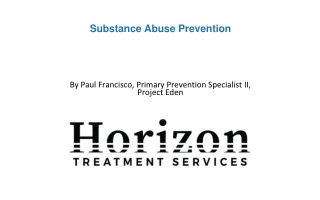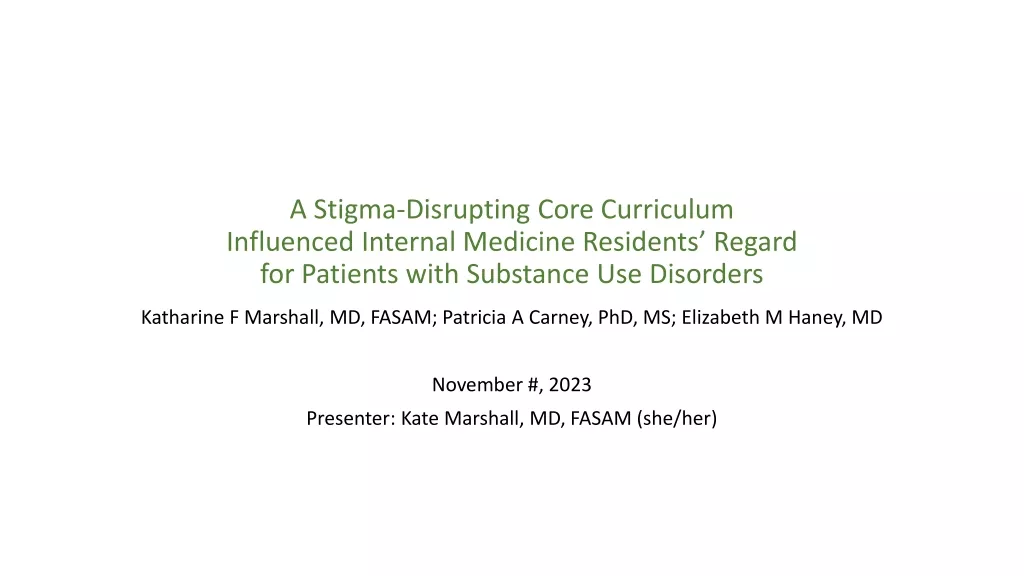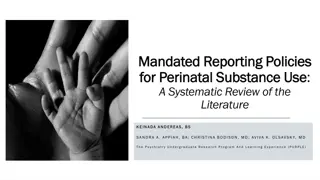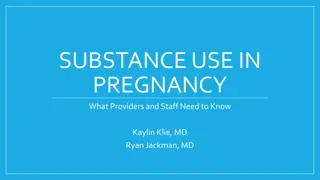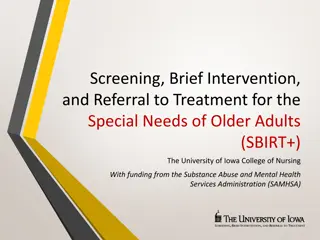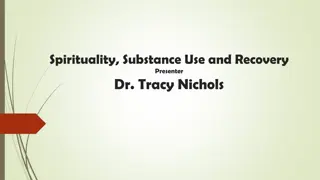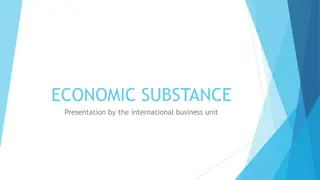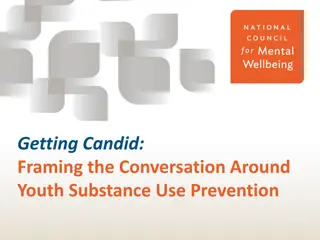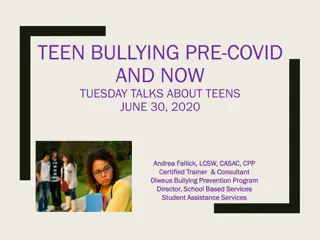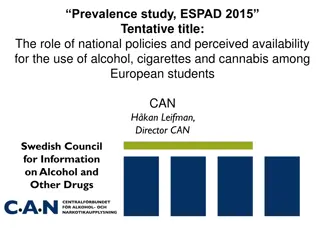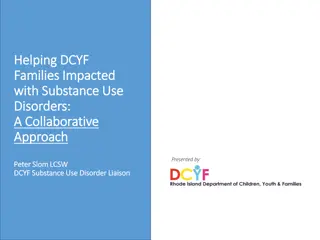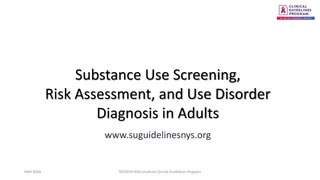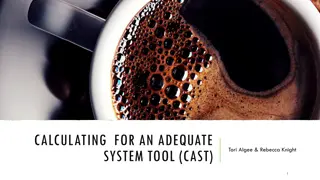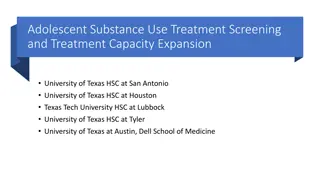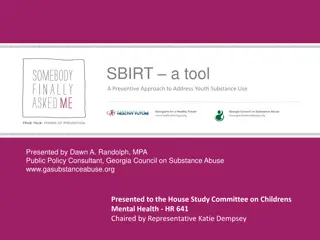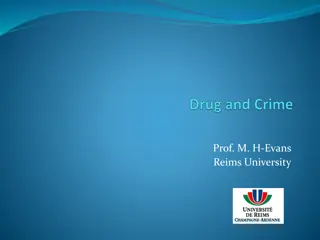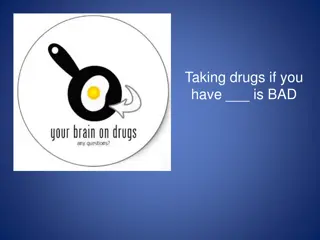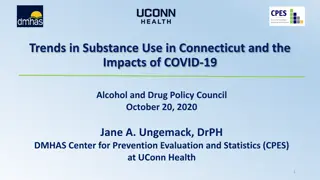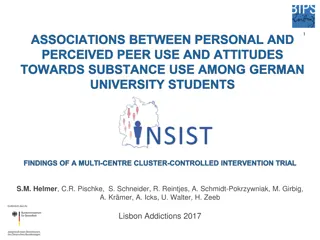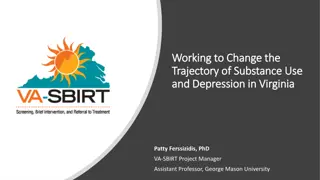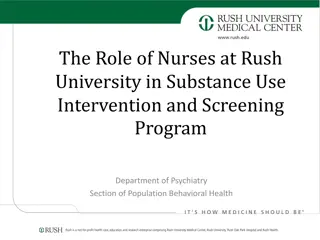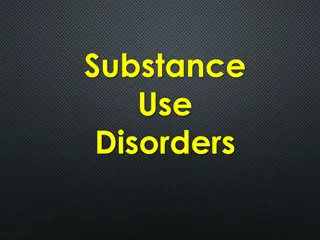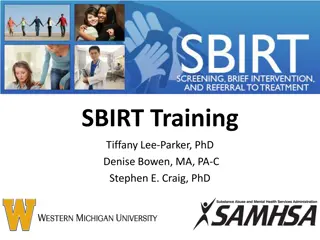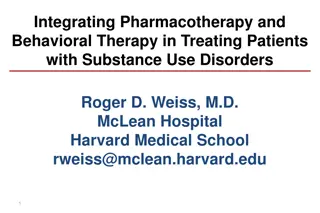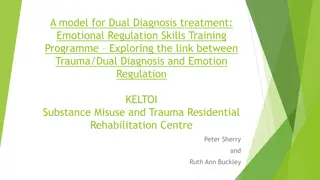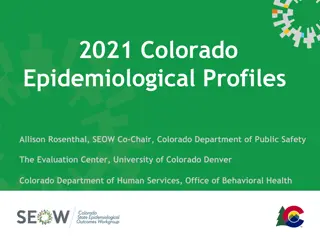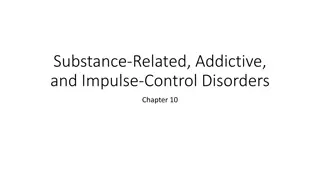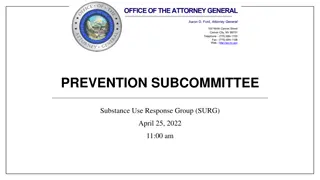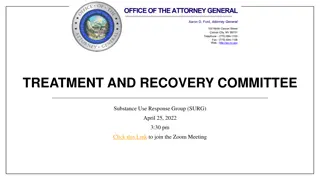Substance Abuse Prevention
Exploring substance abuse prevention strategies by Paul Francisco, a Primary Prevention Specialist. The session covers defining substance abuse, statistics of youth substance use, types of substances used, warning signs for parents, and preventative measures. Learn about the harmful effects of vapin
0 views • 42 slides
Drug-Free Workplace Training Overview
This drug-free workplace training provides essential knowledge for supervisors in identifying and responding to substance misuse among employees. It covers statistics on substance use disorders, the benefits of a drug-free workplace, relevant federal laws, warning signs of substance misuse, and the
2 views • 27 slides
Enhancing Internal Medicine Residents' Approach to Patients with Substance Use Disorders
This study focuses on developing and implementing a stigma-disrupting curriculum to improve internal medicine residents' attitudes and knowledge regarding patients with substance use disorders. By addressing provider stigma and enhancing preparedness, the aim is to promote positive regard and increa
1 views • 27 slides
Substance Use Screening Tools in Pregnancy: SURP-P
The Substance Use Risk Profile Pregnancy (SURP-P) is a screening tool to assess substance use during pregnancy. It involves questions about marijuana smoking, alcohol consumption, and perceived need to cut down on substance use. Scoring determines low, moderate, or high risk levels. A brief assessme
4 views • 6 slides
Mandated Reporting Policies for Perinatal Substance Use: A Systematic Review of the Literature
This systematic review explores mandated reporting policies in the U.S. concerning perinatal substance use. It highlights the impact of substance use on perinatal and infant health, the disparities in reporting practices, and the need for early interventions to protect vulnerable populations.
3 views • 14 slides
Substance Use in Pregnancy: Important Considerations for Healthcare Providers
This presentation discusses the impact of substance use during pregnancy, including identifying signs of substance use disorder, trends in national and Colorado statistics, effects on maternal health and fetal development, screening recommendations, minimizing stigma, and treatment options for pregn
0 views • 35 slides
SBIRT+: Tailoring Substance Use Intervention for Older Adults
SBIRT+ is a targeted training approach focusing on Screening, Brief Intervention, and Referral to Treatment to meet the unique needs of older adults, addressing risky substance use in the elderly population. It aims to address the growing concern of alcohol use and medication misuse in Baby Boomers
0 views • 38 slides
Universal Evaluation Framework: Simplifying Evaluation Processes
This session introduces the Universal Evaluation Framework (UEF) developed for evaluating QAA Scotland Enhancement Themes. Participants learn key evaluation questions, evidence capture, and the Theory of Change to enhance evaluation confidence. The QAA Scotland Evaluation Odyssey details historical
2 views • 14 slides
Understanding Spirituality, Substance Use, and Recovery in Treatment
Explore the relationship between spirituality, substance use, and recovery in addiction treatment. Discover the benefits of incorporating spirituality, implementing it in recovery, and connecting with a higher power within oneself. Learn about the characteristics of addiction, the essence of spiritu
2 views • 26 slides
Understanding Economic Substance Presentation in International Business Units
The presentation focuses on the Economic Substance Act (ESA), outlining the scope of resident companies under ESA, relevant activities requiring annual declaration, the Economic Substance (ES) test criteria, outsourcing possibilities, and the Reduced ES test for specific holding companies in Barbado
4 views • 13 slides
Understanding Evaluation in Education
Evaluation in education is a comprehensive term that encompasses measurement, testing, and qualitative examination of student behavior. It involves both quantitative and qualitative descriptions, along with value judgments. Differentiating from mere measurement, evaluation provides a deeper analysis
0 views • 28 slides
Youth Substance Use Prevention in the COVID-19 Era
Understanding youth experiences and mindsets regarding substance use and prevention during the COVID-19 pandemic is crucial. With a majority of youth engaging in substance use before graduating high school, it's essential to address the prevalence and availability of substances. Despite challenges p
0 views • 18 slides
Sustainable Evaluation Systems Workshop Summary
Workshop on Sustainable Evaluation Systems by Stephen Porter at the NEC Conference focused on defining evaluation systems, addressing their failures, and emphasizing the importance of quality, use, and networks in achieving sustainability. Participants engaged in activities such as bingo card introd
0 views • 38 slides
The Link Between Teen Bullying and Substance Use: Insights and Implications
The article discusses the link between teen bullying and substance use, emphasizing the various forms of bullying such as physical, verbal, and cyberbullying. It also explores the relationship between being bullied and engaging in alcohol and marijuana use, highlighting statistics on how bullying ca
0 views • 15 slides
Impact and Evaluation Toolkit for Churches and Christian Charities
This toolkit aims to equip churches and Christian charities engaged in small-scale social action projects to think about impact, measure impact, choose data tools, reflect on evaluation data, and use it effectively. It covers principles of evaluation, setting objectives, selecting indicators, storyt
0 views • 34 slides
Overview of Monitoring and Evaluation in the GEF
The Evaluation in the GEF and Training Module focuses on promoting accountability and learning within the Global Environment Facility (GEF) through monitoring and evaluation activities. The GEF Independent Evaluation Office plays a crucial role in assessing results, effectiveness, and performance of
0 views • 25 slides
Tracking and Measuring Outcomes in King County, WA Mental Health and Substance Abuse Services Division
King County Mental Health, Chemical Abuse, and Dependency Services Division manage publicly funded mental health, substance abuse services, and co-occurring disorders. They prioritize interventions, job readiness, homelessness prevention, and reducing emergency medical and criminal justice involveme
1 views • 24 slides
The Role of National Policies in Adolescent Substance Use
This study focuses on the impact of national policies and perceived availability on alcohol, cigarette, and cannabis use among European students. Despite declining trends in alcohol and smoking, these substances remain prevalent among young people, causing harm. By examining availability and prices
0 views • 13 slides
Potential Amendments for Reforming REACH Evaluation Process
Discussion at the Ad-hoc Meeting of Competent Authorities for REACH and CLP focused on potential options for amending the REACH Regulation to reform the evaluation process. Topics included registration-related measures, substance evaluation, testing proposals, compliance checks, and expectations dur
0 views • 30 slides
Collaborative Approach to Supporting Families Impacted by Substance Use Disorders
Peter Slom, DCYF Substance Use Disorder Liaison, presents a collaborative approach to helping families impacted by substance use disorders. Partnering with Parents Support Network, the program offers assistance, referrals, and support through Certified Peer Recovery Specialists. These specialists he
0 views • 13 slides
Substance Use Screening, Risk Assessment, and Disorder Diagnosis Guidelines for Adults
This clinical guideline program aims to increase identification of unhealthy substance use among New York State residents and improve access to evidence-based interventions. It provides guidance on substance use screening, risk assessment, and promoting a harm reduction approach for substance use di
0 views • 19 slides
Understanding CAST: A Tool for Assessing Community Susceptibility to Substance Use Disorders
CAST (Calculating for an Adequate System Tool) is a tool developed by researchers at SAMHSA to assess the protective capacity of a community and its susceptibility to Substance Use Disorders (SUD). It considers various community determinants such as demographics, social factors, and access to resour
0 views • 12 slides
Adolescent Substance Use Treatment and Screening Programs in Texas
Expansion of adolescent substance use treatment and screening programs across different University of Texas Health Science Centers in Texas, focusing on implementing systematic screening, evidence-based interventions, and referral pathways for youth with substance use disorders. The initiative aims
0 views • 10 slides
Preventive Approach to Addressing Youth Substance Use: SBIRT Tool Presentation
The presentation by Dawn A. Randolph highlights the importance of preventive approaches in addressing youth substance use. It emphasizes the need for early identification and intervention to ensure a better future for children and teenagers in Georgia. Substance abuse disorders affect millions of in
0 views • 21 slides
The Statistical Association Between Substance Misuse and Criminal Behavior
This brief synthesis discusses the statistical association between substance misuse (specifically drugs and alcohol) and criminal behavior. It draws upon meta-analyses investigating the links between drug use and crime, as well as alcohol consumption and violent behavior. Various theories are explor
0 views • 12 slides
Substance Abuse Treatment Strategies and FDA-Approved Medications
Explore the various substance abuse treatment approaches, including psychological and pharmacological interventions, along with FDA-approved medications like disulfiram, naltrexone, and buprenorphine. Learn about the challenges in substance abuse treatment and the psychology of substance users. Disc
0 views • 13 slides
Trends in Substance Use in Connecticut: Impacts of COVID-19
Examining trends in substance use in Connecticut, this report analyzes the percentages of persons reporting alcohol, tobacco, marijuana, and other drug use from 2005 to 2019. It also delves into the effects of COVID-19 on substance use patterns among different age groups, including youth, adults, an
0 views • 32 slides
Associations Between Substance Use and Peer Influence Among German University Students
This study explores the associations between personal substance use, perceived peer use, and attitudes towards substance use among German university students. It focuses on social norms interventions and the adaptation of personal behavior based on perceived peer behavior. The study aims to assess s
0 views • 26 slides
Transforming Substance Use and Depression Trajectory in Virginia
Patty Ferssizidis, PhD, as the VA-SBIRT Project Manager at George Mason University, is spearheading efforts to alter the trajectory of substance use and depression in Virginia. The SBIRT model is being utilized to screen, identify, intervene, and connect individuals with substance use risks to appro
0 views • 20 slides
Evaluation of FME Zero Emission Neighbourhoods in Smart Cities
The mid-term evaluation process of FME Zero Emission Neighbourhoods in Smart Cities involves self-evaluation, partner evaluation, and panel evaluation. The procedure includes scientific review, evaluation by scholars, and innovation assessment. Key documents like self-reports, progress reports, and
1 views • 20 slides
The Role of Nurses at Rush University in Substance Use Intervention and Screening Program
The nurses at Rush University play a crucial role in the Substance Use Intervention and Screening Program Department of Psychiatry, focusing on SBIRT (Screening, Brief Intervention, Referral to Treatment) to identify and intervene with those at risk for substance use issues. The program utilizes Mot
0 views • 13 slides
Understanding Substance Use Disorders and Associated Factors
Substance use disorders encompass conditions arising from the abuse of alcohol, psychoactive drugs, and other chemicals, leading to physical and psychological dependencies with withdrawal symptoms upon cessation. Psychological factors such as inferiority complex and poor impulse control, along with
0 views • 42 slides
SBIRT Training Overview: AUDIT, SBIRT Proficiency, Health Impacts, and Video Review
Explore the SBIRT training sessions covering topics such as AUDIT interpretation, SBIRT proficiency checklist, health impacts of substance use, and video reviews. Learn about interventions, screenings, brief interventions, and referrals to treatment for substance use disorders. Gain insights into th
0 views • 15 slides
Integrating Pharmacotherapy and Behavioral Therapy for Substance Use Disorders
This presentation by Dr. Roger D. Weiss discusses the integration of pharmacotherapy and behavioral therapy in treating patients with substance use disorders. It emphasizes the goals of behavioral therapy alongside medication treatment, focusing on medication adherence, defining and achieving substa
0 views • 73 slides
Gender Disparities in Substance Use Prevention and Treatment for Women
This study by Julie Schamp explores the experiences and barriers faced by female substance users in alcohol and drug prevention and treatment. It highlights significant gender differences globally in substance use, the challenges women encounter in accessing treatment, and the need for gender-sensit
0 views • 21 slides
Exploring the Link Between Trauma, Dual Diagnosis, and Emotional Regulation in Substance Misuse Treatment
The Emotional Regulation Skills Training Programme at Keltoi Treatment Model focuses on addressing the complex relationship between trauma, mental illness, and substance misuse. Challenges in treating trauma and substance misuse are highlighted, emphasizing the importance of addressing both issues f
1 views • 16 slides
Colorado Epidemiological Profiles 2021 - Substance Use Data and Analysis
The 2021 Colorado Epidemiological Profiles provide in-depth data and analysis on substance use patterns, impacts, and demographics in Colorado. The profiles cover alcohol, marijuana, opioids, and tobacco, along with special considerations for populations like LGBTQ, veterans, tribal communities, unh
0 views • 19 slides
Understanding Substance-Related and Addictive Disorders
This chapter delves into Substance Use, Intoxication, Substance Abuse, Addiction, Withdrawal, and Psychological Dependence. It explores the varying levels of severity in substance-related disorders and the distinction between physiological and psychological reactions to drugs.
0 views • 37 slides
Prevention Subcommittee Substance Use Response Group (SURG) Meeting Highlights
The Prevention Subcommittee SURG met on April 25, 2022, to discuss strategies for reducing substance use disorders. The meeting included a call to order, public comment session, member introductions, and an overview of the committee's scope, emphasizing harm reduction and comprehensive prevention ef
0 views • 33 slides
Treatment and Recovery Committee Meeting for Substance Use Response Group
The Treatment and Recovery Committee, part of the Substance Use Response Group (SURG), is hosting a meeting on April 25, 2022, at 3:30 pm. The agenda includes establishing quorum, public comments, member introductions, and discussing special populations affected by substance use disorders. Join the
0 views • 36 slides
